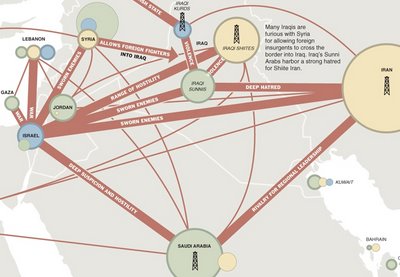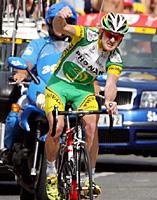Yesterday's
celebratory quote of Thomas Jefferson received a thoughtful
reply from
Suresh V, reminding us that the author of
The Declaration of Independence was a lifelong slave-owner.
Suresh is much more polite in his criticism than Jefferson's contemporaries were. Foremost among the Jefferson-bashers of history is Alexander Hamilton.

Though not as celebrated as Jefferson, Hamilton arguably had even more influence in shaping the modern United States of America. You might say that Jefferson planted the seed of the American Revolution and Hamilton tended the resulting garden.
Hamilton saw Jefferson's vision of populist democracy as misguided and dangerously self-serving. When Jefferson publicly called Hamilton a corrupt monarchist (for such atrocities as creating the US Federal Bank and Customs Service), Hamilton pointed out that Jefferson's tactics were far more likely to bring down the new republic, as quoted by Ron Chernow's excellent biography
Alexander Hamilton:
"If [I] had wanted to impose a monarchy upon America, [I] would follow the classic path of a populist demagogue: I would mount the hobbyhorse of popularity, I would cry out usurpation, danger to liberty etc. etc. I would endeavour to prostrate the federal government, raise a ferment, and then ride in the whirlwind and direct the storm."
This vicious debate between Jefferson and Hamilton reminds me of today's debate over
net neutrality. In one corner, we have the paragons of online populist democracy, led by Google. In the other corner, the titans of industrial Internet infrastructure, such as Comcast.
In contrast to some of my blogger friends who support net neutrality (e.g.,
Bill Ives,
Mal Watlington), I am glad that the government has so far refused to prohibit Comcast and other telcoms from instituting preferential pricing schemes for access to their Internet networks. With lobbyists from
Google now crying "antitrust", I think we have reason to suspect that net neutrality--as it is argued in Washington, anyway--is as much about protecting the Google-Amazon-eBay oligopoly of
social commerce (as reported in "
Going Long" by John Cassidy in today's
New Yorker) as it is about protecting individual life, liberty, and pursuit of online happiness.
Which mega-corporation are you cheering for?
This work is licensed under a Creative Commons Attribution-ShareAlike 2.5 License and is copyrighted (c) 2006 by Connective Associates except where otherwise noted.
 As I mentioned in a post on jerks and fools at the office, negative relationships often influence the big picture more than their positive counterparts, and the study of negative-valued social networks is still underappreciated. Professor Joe Labianca is one of the researchers working hardest at "balancing the ledger" to understand social networks that include negative as well as positive relationships.
As I mentioned in a post on jerks and fools at the office, negative relationships often influence the big picture more than their positive counterparts, and the study of negative-valued social networks is still underappreciated. Professor Joe Labianca is one of the researchers working hardest at "balancing the ledger" to understand social networks that include negative as well as positive relationships.



